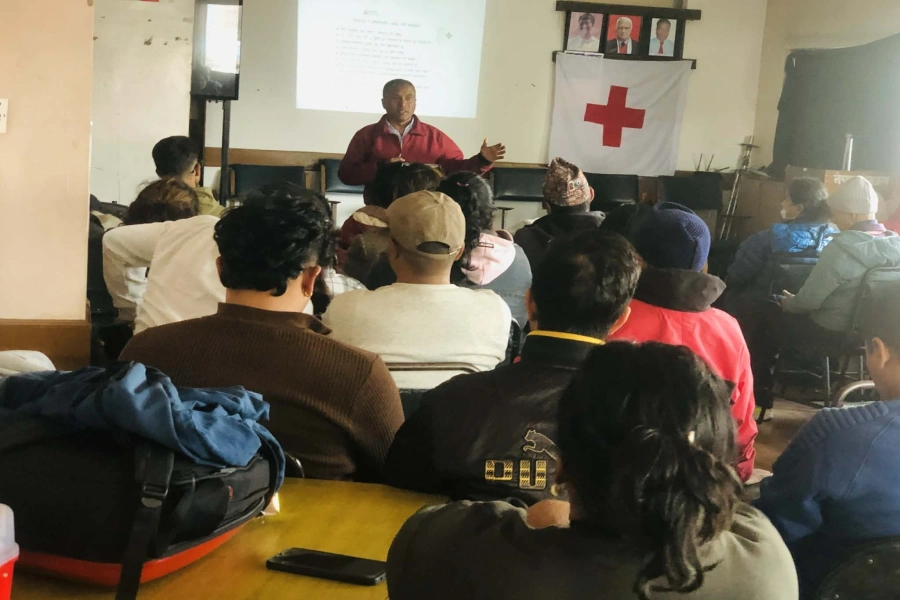As we navigate through this difficult period, let us pause to appreciate what we have and be grateful for how special, beautiful and fortunate our lives are, for people who are working day and night to keep us safe and for having our loved ones around.
Coronavirus outbreak is a global pandemic that has ravaged the world instilling anxiety, fear, and negativity in almost every one of us. It has forced us to confine ourselves to our homes suppressing our human impulses for connection and making social distancing the new normal. However, maintaining social distancing isn’t as easy as we thought it to be. Not because we don’t like staying at our homes but because humans are innately social and have always lived in groups. Therefore, when we are forced to physically stay away from others it disrupts our fundamental need for human connection.
From time immemorial social living is our default orientation so when we are advised to practice social distancing many of us resist it. Resistance to this change is normal when we acknowledge that our drive to be with other people is entrenched into who we are and into how our culture operates. But, for the greater good, we should balance between individual rights and public safety and stay at home.
The lockdown which seems to be unceasing has wrought changes that are not just temporary. The feeling of helplessness and fear that forays into our mind with the daily updates about Covid-19 cases and the death toll has made us cynical about life. We can either let the cynicism devour us in our mind or stay mentally firm and focus on some fundamental learning lying beneath the uncertainty. While we endure the discomfort of negative emotions, illness, and death, and hope that things get better, there are valuable lessons that can be drawn from the lockdown.
Be self-reliant
Dramatic rise in COVID-19 related deaths in Sudur Paschim; 23 d...

Covid-19 has changed our lives and with this change, our dependency on others such as domestic help, driver, nanny, and the cook has gone down. The need to remain safe and the fear of the deadly virus has made almost every member of the family contribute their bit in the household chores. The kitchen which was labeled as the ‘women’s den’ before the lockdown has had men and children trying their culinary skills more often as compared to the period before the pandemic. This is a major cultural shift especially in our society where we have gender designated roles. The pandemic has taught us the essence of self-reliance in shouldering every hardship the lockdown has fetched. We learned, reflected, and leveraged from the opportunities that existed within the adversaries of the pandemic not because we wanted to but because we had to, for our safety and survival. Unfortunately, there was no second choice.
Practice gratitude
Our days are filled with a gamut of emotions. There is always a new worry and a new fear which gradually creeps within. However, let's focus on the silver lining believing that this too shall pass. So, as we navigate through this difficult period, let us pause to appreciate what we have and be grateful for how special, beautiful and fortunate our lives are, for people who are working day and night to keep us safe and for having our loved ones around.
When we practice gratitude, it infuses positivity into everything we do, shifts our focus to all that we have, and helps us transcend from the state of deprivation to a state of sheer abundance, positivity, and hope. The lockdown has not only taught us to evolve, upgrade, and be resilient but has also made us realize how lucky we are to see another day and to be at home surrounded by people we love.
Virtual existence
Covid-19 has made our virtual existence the new reality and technology as the lifeline. It has forced many of us to rethink our lives from managing work to school to entertainment. From video conference calls with family, attending business meetings online, watching kids attend online classes to streaming online workouts, our lives have witnessed a complete transformation. Technological dependency has become a necessity and not an option anymore. It has not only changed the way we interact but also the way we do business.
The pandemic has changed us—as customers, employees, citizens, and humans—forcing businesses to rapidly adjust to the needs of their customers and suppliers with innovative ways. Organizations have to act fast and be able to use technology to keep going and rethink their business model. Those who can embrace this digital transformation will be the ones ahead in the competition. Technology, social media, and the internet which was often considered as a threat to our social fabric should now be viewed as a lifeline.
Working from home is not easy
The pandemic has drastically changed the contours of our professional life compelling companies to encourage or mandate their employees to work from home. The option of working from home which was once deemed as privilege has suddenly become a necessity and upskilling for the digital world has become a top priority for organizations. While this new culture of ‘work from home’ has suddenly sprung into the mainstream, life isn’t easy as employees perceived it to be. With homes functioning as a workplace and the physical boundaries between work and the home getting blurred, both work and family dynamics are affected. With the work-life conflict in one hand and health risks associated with working long hours on laptops, cell phones, and tablets, on the other, have made working from home a tough option.
Insomnia, backaches, restlessness, stress, and anxiety due to lockdown coupled with the pressure to meet deadlines and targets at work have amplified the challenges faced by employees. To help employees overcome these challenges organizations must continue to motivate employees while they are working from home and also help them maintain positivity to safeguard employees’ well-being.
The virus spares none
The invisible virus has almost become a leveler. Covid-19 has become a global threat from a virus that recognizes neither religion nor geographic boundaries. It spares none, rich or poor, Hindu or Muslim, urban or rural, men or women all are equally vulnerable to its attack. Fear for life has become predominant in all of us irrespective of ethnicity, religion, nation, and continent. The virus has brought us all to our knees making us realize that until we unite and act collectively, we will fail to overcome this crisis.
However, until we hold on to our belief that it will pass, we have a chance to remember the learnings from Covid-19. Perhaps it is time that we reflect, rethink, and reassess our thoughts and actions towards creating a more equitable future for all and focus on moving forward together as a human family.
The author, a freelancer based in New Delhi, is also a management expert at EMERGE, Nepal



-1770648553.webp)





_20200814192758.jpg)



























